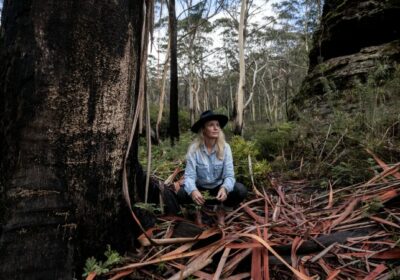A nature prescription could be just what the doctor ordered

In 2021, Christie Little led a small group deep into the pine and eucalypt of Penrose State Forest.
The forest draws artists, tourists and rich Sydneysiders looking for a weekend getaway. But this group was unusual. Rather than just seeking the solace of nature, they were seeking repair.
Christie Little in bushland behind her Blackheath property.Credit:Brook Mitchell
Each had lost a house in the 2019-20 Black Summer bushfires. They had come to fear nature, said Little. She had brought them there to heal – using a therapy known in Japan as shinrin-yoku, or forest bathing.
“It was a way of dealing with their loss, and a safe way of reconnecting with nature,” said Little, a nature therapist. She led them through a slow sensory tuning: What can you hear? What can you smell?
“It’s about going slow, reconnecting people to their senses, giving them that time to reconnect to themselves through the metaphors and mirrors nature offers, and really giving them space to themselves to hear their own inner whispers,” Little said.
Shinrin-yoku may be about to become more widespread in Australia, after the University of Wollongong last week received $1.5 million in federal government funding to run a randomised controlled trial – testing if a doctor’s prescription to spend time in nature can actually improve someone’s health.
“It’s about going slow, reconnecting people to their senses, giving them that time to reconnect to themselves through the metaphors and mirrors nature offers, and really giving them space to themselves to hear their own inner whispers,” Little said.Credit:Brook Mitchell
A significant body of evidence suggests people living in places where nature is more bountiful are more healthy, physically and mentally.
Is it possible, therefore, for a doctor to improve a person’s chronic illness by encouraging them to spend more time around nature? Several countries, including New Zealand and America, think so, offering widespread park prescription programs.
“In Australia, we haven’t really done much on this – even though we have beautiful landscapes and continued investment in green infrastructure. It’s time – we really should do something with this,” said Professor Xiaoqi Feng, a co-lead investigator of the trial at the University of NSW.
Shinrin-yoku emerged in Japan in response to the tech-boom that turned Tokyo into a neon wonderland filled with burnt-out salarymen. Shirin-yoku isn’t exercise. “It is absolutely not a hike,” said Little. You walk slowly. You tune your senses into nature: the rustle and crunch of leaves, the tinkle of birdsong. You just be.
Proponents have several theories about why it might work. Perhaps it gets you away from the stress of everyday life. Perhaps exposure to different bacteria and fungus adjusts your microbiome.
Or perhaps, after millions of years spent on the savannah, our bodies are simply hard-wired to enjoy nature. Perhaps we find tranquil lakes beautiful because fresh water has always meant safety and survival.
“Our history on this planet was 99 per cent of our time on this planet was among trees, and now 1 per cent living in concrete boxes,” said Daniel D’Appio, an accredited certified forest therapy guide at Primary and Community Care Services, a partner in the trial. “We have this innate thing inside us that reacts well to nature. It’s a meant-to-be-there feeling. And we don’t give ourselves a chance to go and do it.”
But the evidence for any of these theories, and for park prescribing in general, remains patchy.
The University of Wollongong’s Professor Thomas Astell-Burt points to several randomised controlled trials showing people asked to walk in nature saw small benefits to physical and mental health – but not when they walked on a city street.
But most studies in the area are small or poorly designed. When they do show effects, they are typically small – a small increase in time spent outside, for example.
One possible problem could be uptake. One study found just 13 per cent of people prescribed a park pass actually used it.
That cropped up in one of the few recent trials in Adelaide, where GPs referred more than 30 patients with diabetes, obesity, anxiety or depression to an eight-week “nature prescription” program. Just six ended up participating; the others said they did not have time, or found the concept strange.
The University of Wollongong’s trial will go a long way to addressing the evidence gaps. The team plan to test the prescriptions on people over 45 with cardio-metabolic diseases.
Survey data suggests most people would be keen on a nature prescription, said Astell-Burt. “All we need to do is say: ‘how do we fulfil that interest?’”
Liam Mannix’s Examine newsletter explains and analyses science with a rigorous focus on the evidence. Sign up to get it each week.
Most Viewed in National
From our partners
Source: Read Full Article

